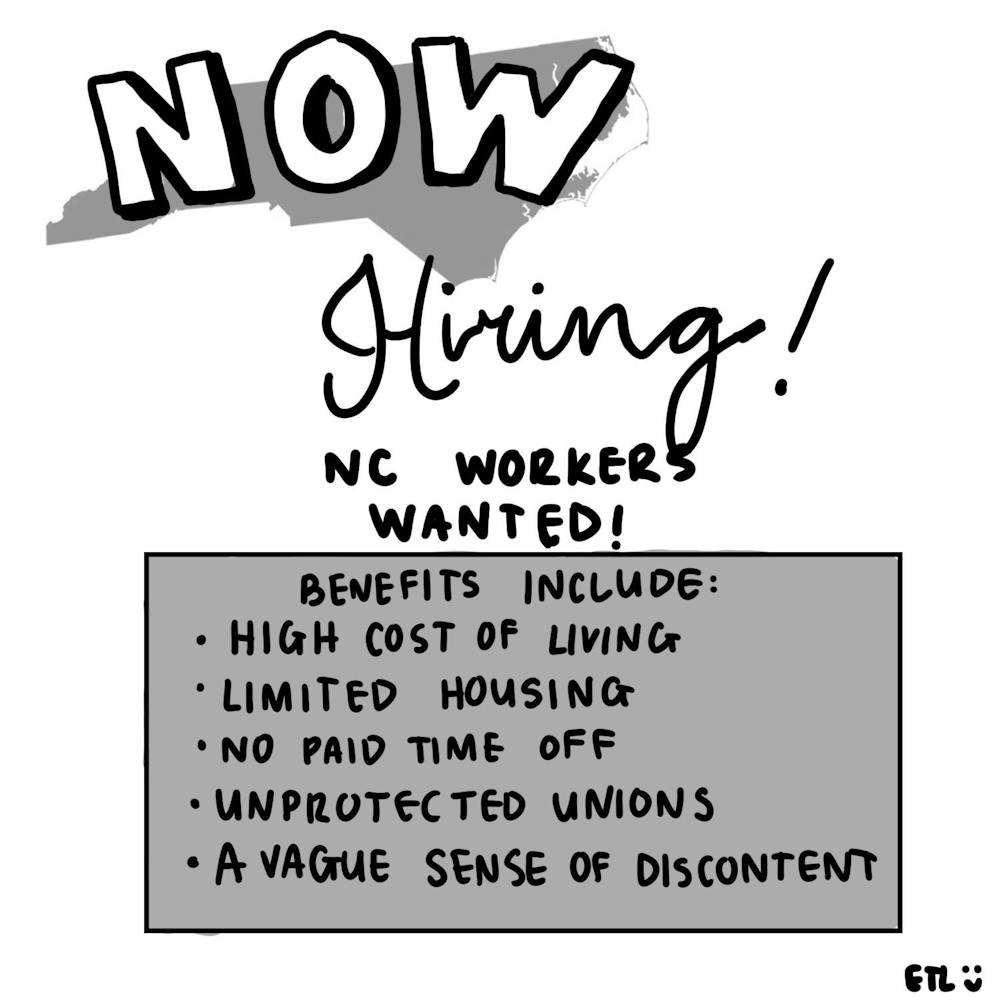Amid significant economic development, the skyline expanding as more businesses thrive, the North Carolina minimum wage remains stagnant at $7.25 per hour. In a state categorized by an intellectual hub for education, teaching students progressive ideologies in schools and then sending them into a workplace overrun by oppressive conditions is downright hypocritical.
This overwhelmingly large price disparity can be broken down into two distinct problems: money-hungry corporations and a lack of proper legislation acting as an enabler.
Any efforts to eradicate this problem have been motionless — dating back to 2010, North Carolina has made no progress on this issue. Watching as over 20 other conservative-leaning states such as Florida and Arizona make steps in this labor movement, North Carolina is continuously putting their foot down and succumbing to workforce exploitation.
Now, circling back, who is to blame? This question can be better answered through the concept of greed. It simply boils down to the fact that highly-prominent company owners and employers see workers for nothing more than their abilities and hours. To them, a minimum wage is simply the basic economics of a price floor — a minimum requirement they are forced to pay their employees.
However, the issue that is plaguing the development of this state is the fact that this “basic standard of living” has long been an unlivable amount. According to data gathered from the M.I.T. Living Wage Calculator, the conclusion is drawn that an overall living wage in North Carolina is $21.56 per hour. While this number varies based on the designated city, the fact remains that not a single individual is adequately supported with the currently instituted price line.
With the past couple of years’ economic successes, North Carolina is becoming a notably excellent state for business endeavors, attracting attention from companies and workers alike. However, exceedingly immense corporate advances can turn seeking help into promoting entitlement. It’s time for companies to ground themselves, stop profiting on desperation and humanize the individuals that they are supposed to be mentoring.
This leads us into the next shortcoming: legislation. North Carolina is one of 24 U.S. states in which statewide citizen-initiated ballot measures are inaccessible. This means that citizens are unable to propose statutes or constitutional amendments. This completely disregards their right to make fundamental changes to the policies that severely affect not only their own daily lives, but potentially their entire families. As a result, legislative leaders are able to fully ignore their voters’ pleas, shelving minimum wage bills without a second thought and facing remarkably minimal repercussions.
Additionally, inefficient timelines regarding pending bills furthers citizens’ concerns that a minimum wage improvement may be unattainable anytime soon. With the introduction of Senate Bill 440 in March 2023, workers felt a spark of new economic potential with this proposed rise to $15/hr. However, it is September 2024 and no difference lies in sight, showcasing the unfortunate lack of priority this concern yields.
When workers’ requirements are ignored, businesses cannot prosper, severely decreasing North Carolina’s potential to emerge as an economic superhero of the United States. A state can’t spearhead its economy hiding behind outdated regulations created in a different time. So while big businesses currently appear to be flourishing, underpaying workers will eventually catch up to them. Corporations that run on greed and worker exploitation are systematically flawed at their base, and they will fall.



